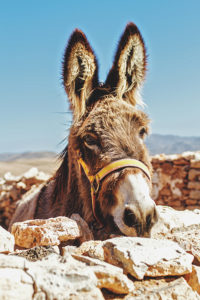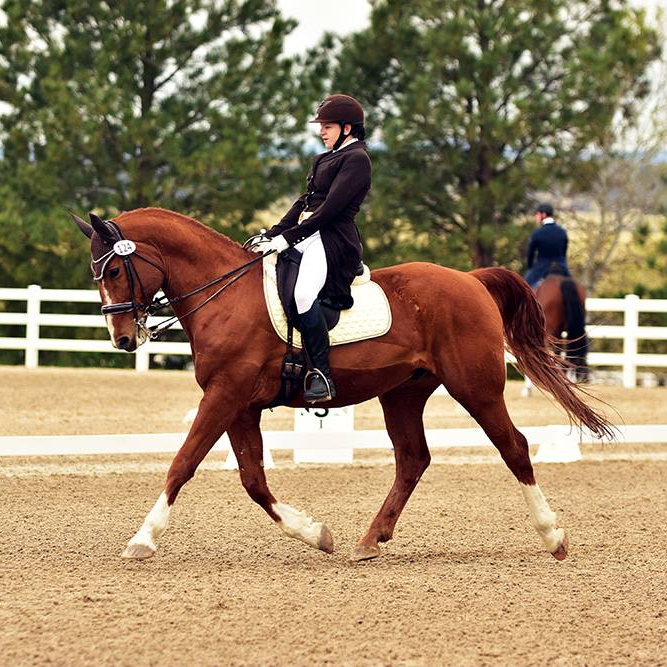We partnered with Foghorn Farm Donkey Training to bring you this
- Donkeys do not think like a horse. It’s evolutionary. Horses evolved from the forest to living on plains, where if something startled them, they could outrun it. Therefore horses have a strong flee response, that we take advantage of often in training them. Donkeys evolved in mountainous, desert areas, where fleeing might end up resulting in being off a cliff and out of the gene pool. Therefore, while donkeys do sometimes flee for short periods before they turn and look, donkeys have more of a “balk” response. If you try to add pressure (whip, voice, etc) when a donkey is balking, you will only add to their concern and cause a longer balk. The best way to deal with donkeys? Act like you have all day, and it’ll take you five minutes. When teaching a donkey to trailer load, I often start out by bringing a bottled drink and a sandwich. If I know I can stay there a long time, the training usually goes a lot faster! Donkeys also prefer donkey company to horse company, as horses do not “speak” donkey. Many rescues will only adopt out two at a time for this reason.
- Donkeys can not be fed like a horse. Donkeys evolved in a desert climates where brush and grass were sparse and donkeys must travel long distances to get small bites. Donkeys are browsers, meaning they can actually get nutrition out of wood. Yes, your wood barn is at risk. Yes, that “Stop Chew” stuff is tasty to donkeys. Yum, spicy! Best advice? Get a metal barn. And hotwire for that nice wooden fence. And no trees you like in the paddock, they will be chewed to death. The nice thing about donkeys is they need very little nutritionally, assuming they are not skinny, old, neglected, or pregnant. Donkeys need absolutely NO alfalfa. No high carb, protein or sugar feeds. That means donkeys generally do not need grain of any sort unless there is a reason medically for it. Sweet feed is like feeding a diabetic candy. Don’t do it. Plain, straight grass hay is all donkeys need. Donkeys get fat very easily and their bodies create big fat pads along their crest, back, and croup. Their crest will often break and fall over if it gets too heavy, and that can never be corrected. Donkeys founder easier than ponies on any lush pasture. The best management for donkeys? Dry lot, slow feeders, and lots of exercise being trained to do something like carting, packing, or hiking!
- Donkeys are anatomically different than horses. Donkeys have several differences in their anatomy that are relevant. First, their hooves are not shaped like a horse’s hoof, and should never be trimmed like one. They are more upright, and more cupped on the bottom. This makes it so they grip better, sort of like goats. Most horse farriers trim donkeys like horses and seriously harm ligaments and tendons. There are some good resources out there for donkey hoof care, and many donkey owners trim their donkeys themselves. Donkeys need trimmed as often as horses unless they live on rough enough terrain to self trim. Donkeys also only have chestnuts on their front legs, not on the hind. They are flat and smooth. Donkeys have long, wonderful ears and love it when you rub deep inside them. There are companies that make donkey fly masks, as those ears often get bitten up. Donkeys also have different coats than horses. While horses have two coats, an undercoat and a shiny over coat that slicks off water, donkeys lack that overcoat, and water will soak through to their skin, freezing on cold days, and getting trapped there on warm days, leading to rain rot an other infections. A good shelter or a waterproof coat is a must for donkeys in our wet (comparatively) climate. Donkeys also shed out their winter fluff much later than horses.
- Donkeys can be trained to do all of the same things horses can do. The training just has to be different. Because of the fact that donkeys evolved differently than horses, training a donkey requires that your timing be better and that you forget most of what you learned as a horse person, so that you can see things from a donkey’s perspective and on “donkey time”. It is sort of like “island time.” Your initial training sessions should be short and never repetitive. The best way to describe this is that if you ask your donkey to do something, and they do it correctly, and you ask again….the donkey starts to think he didn’t do it right the first time. So he tries other options. Once they do it correctly, reward with lots of love and praise and then quit, or change activities. Donkeys despise going around in circles, doing the same things again and again. Training donkeys requires initiative to make things interesting for the donkey. Donkeys can be trained to pack, hike, drive, and ride, just like horses. Obviously, only mammoths should be used by a adults of appropriate weight to ride. There are even donkeys doing dressage!
- Donkeys need the same medical care as horses, and have some unique medical issues as well. Donkeys need deworming, shots, hoof and dental care at the same intervals as horses. Donkeys do have some unique medical needs. Jacks must be castrated slightly differently than stallions. They might bleed out if not ligated. Donkeys tend to get more skin issues than horses, and are WAY more sensitive to flies. I use long athletic socks and cut a hole it the toe and pull it up the leg. Some people use fly wraps. Depending on where you are, fly sprays may or may not be effective, although I tend to think they at least help. Donkeys will get such bad fly bites that they will bleed. Good manure management is essential. Fungal and skin infections are more common in donkeys, as they do not have the protective upper layer of fur that a horse does. Moisture causes skin issues, especially in spring. They will create dust bowls in their paddocks to roll in, which helps coat their skin with dirt that prevents bug bites. If you wash your donkey, you will need to really provide fly protection in more extreme measures. Donkeys tend to founder easily if fed incorrectly, and their hoof care is slightly different. Farriers must manage their feet like a donkey, not like a horse, as donkeys have differently shaped feet. Donkeys also tend to abscess more often than horses in wet weather, as they are not meant to live in a wet climate. Good farrier care can go a long way towards preventing abscessing. Donkeys get fat easily on anything rich or lush. Pasture is not always a good idea for them, and alfalfa and sweet feed are big NO NOs.
- Donkeys are more doglike than horselike. Donkeys become very bonded to their people, or person. In fact, they are usually downright loyal, and will leave food or other equine companionship to really spend quality time with people they trust and love. Many horse people I have had as donkey training clients have observed that after getting a donkey, they feel like they like donkey personality more than horse personality. They are just…loving! Donkeys, if they really truly love you, will rest their head on you. It is their way of saying “you are my herd.” There is nothing better than coming home or to the barn and being greeted by a long bray, and being “hugged” by your beloved donkey. Donkeys enjoy being in your personal space, and if trained to back off when needed, can be very safe being very close to their owners, in a way that many horses are not.
- Donkeys, in the US, come in three sizes. While there are a few breeds of donkeys, mostly in the UK, in the U.S. we categorize by size. Minis are 36 inches and under. Standards are anything between that and mammoth sized, which are 54/56 inches and over depending on sex and registry. Minis are great driving animals, and some pack/hike or are rides by small children. Standards also make great pack and cart donkeys. Mammoths are pretty rare and depending on their size, muscling, and conformation, can be ridden by adults of appropriate weight (20% or less of the donkeys’ body weight including tack).We ride our mammoth donkeys and truly love them for trail riding, where they excel.
- Donkeys are not necessarily good herd guardians. The problem with donkeys as herd guardians is threefold. First, donkeys do best with other donkeys anyway. Second, donkeys tend to attack smaller animals, including your newborn calves/goats/and pet dogs. I have been collecting story upon story of people who have to rehome their donkey because they were (surprise!) acting like a donkey. Third, donkeys are PREY animals. Not predators. They do not usually have the strength or ability to protect themselves against larger predators. Even a determined large dog can kill a donkey easily, especially a mini. Two of my mammoths were attacked by a determined pitt bull that wriggled out a car window. They were nearly eviscerated. Have an excellent guardian donkey? GREAT! Do not suggest them to everyone else. Donkeys have a very small chance of actually being a good guard, and people buy them all the time thinking every donkey will be a fantastic guardian, only to be bitterly disappointed when they are not. This creates unwanted donkeys that are labelled as “calf killers” or some such, which is just awful. The donkey was put in a the wrong situation. Let’s let this myth die please!
- Donkeys can only hold up to 20% of their weight. They are not Hercules. I have heard people claim donkeys can carry 50% of their body weight. Imagine if this was your horse. That would NOT be ok! Just because donkeys are incredibly stoic and oftentimes don’t show pain, it does not mean we should take advantage of that. “Sports” like Donkey Basketball, often used in charity events, take advantage of the fact that small standard donkeys often will work under extremely heavy and unbalanced people, not showing the pain they are in. Donkeys love to work and have a job, but need to be weighted according to their size and conformation. Donkeys also grow slower than horses, and mammoths mature at around 7 years old (minis around 3-4 and standards around 5-7) So asking a donkey to bear weight before age 5 is not only cruel, but unhealthy for their joints, which are still closing.
- Donkeys live longer than horses. Donkeys , if taken care of well, can live upwards of 40-50 years! Average is obviously slightly lower than that, but donkeys do tend to live much longer than horses. If you are older and decide to get a young donkey, make arrangements for them to be taken care of after you are gone! A 18 year old donkey is mid life, not elderly, so don’t pass up those later teen-early twenties donkeys, they will be with you a long time!
In making this list, I realized that there are SO many more important facts about donkeys; their care and training, that need to be more common knowledge. Many vets and farriers never learn about donkeys at all, and treat them as small horses, telling owners very incorrect information on feeding and care. There aren’t too many scientific articles out there that are donkey specific. Many new donkey owners end up with an animal that they suddenly realize is very hard to find reliable information about. If you mention donkeys in public, it is guaranteed that you will get a few stories, responses and “facts” about donkeys that make absolutely no sense and oftentimes fall under the label of “donkey myths.” It is time to dispel those myths and see donkeys as the wonderful and unique equines they are! Any questions can be directed to Rachel Karneffel at Foghorn Farm Donkey Training: foghornfarmdonkeytraining@gmail.com.







Leave a Reply
You must be logged in to post a comment.